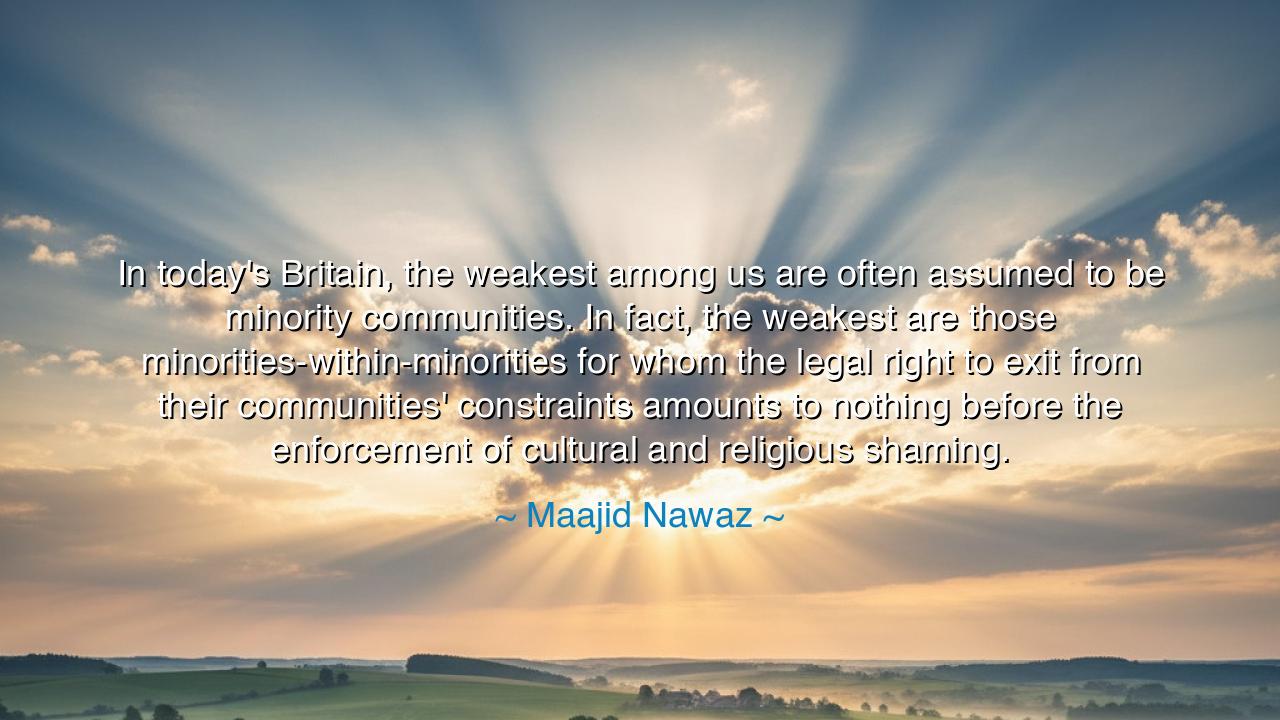
In today's Britain, the weakest among us are often assumed to be
In today's Britain, the weakest among us are often assumed to be minority communities. In fact, the weakest are those minorities-within-minorities for whom the legal right to exit from their communities' constraints amounts to nothing before the enforcement of cultural and religious shaming.






In the words of Maajid Nawaz: “In today’s Britain, the weakest among us are often assumed to be minority communities. In fact, the weakest are those minorities-within-minorities for whom the legal right to exit from their communities’ constraints amounts to nothing before the enforcement of cultural and religious shaming.” These words pierce like a double-edged sword, for they remind us that oppression does not only come from outside a community, but can arise within it, hidden beneath the banners of faith, culture, and tradition. They call us to see that freedom written in law means little if fear and shame bind the heart more tightly than chains.
The ancients knew well that tyranny wears many masks. A king may enslave his people with swords, but a priest or elder may enslave them with shame. Laws may proclaim liberty, yet unwritten rules enforced by community and family can suffocate those who dare to live differently. Nawaz speaks of minorities-within-minorities: the women, the dissenters, the converts, the rebels—those who find themselves doubly trapped, marginalized not only by the wider society, but also by the very circle meant to protect them.
Consider the story of Hypatia of Alexandria. She was a philosopher in a time when women were expected to be silent, and though she was honored by some, she was scorned and attacked by those within her own city who saw her learning as defiance of tradition. Though the law gave her standing as a teacher, cultural forces branded her a threat, and she was slain by the mob. Her tale reveals the truth in Nawaz’s warning: the greatest weakness comes when one’s community becomes both shelter and prison, silencing voices through shame more powerful than any law.
So too in our age, there are young women born into rigid traditions who long for education, freedom, or choice in love. The legal right may stand before them: the courts, the protections, the promises of equality. Yet when their own families threaten disownment, their neighbors whisper dishonor, and their communities cast them out, that right becomes hollow. For what good is freedom on parchment when the cost of claiming it is loneliness, exile, or even violence? Thus, Nawaz reminds us that the battle for liberty is not only fought in parliaments, but in the hearts of men and women bound by unseen chains.
History offers other examples. The Marranos of Spain—Jews forced to convert to Christianity—lived as secret minorities-within-minorities, trapped by both the Inquisition and the shame imposed by their neighbors. To outwardly conform was survival; to inwardly resist was despair. The law claimed they were Christians; their hearts told them otherwise. The true oppression was not in statutes alone, but in the pressure of community and the fear of betrayal. Nawaz’s words echo across centuries: cultural enforcement can be as cruel as political law.
The deeper meaning of this quote is that liberation must be both external and internal. A society may grant the legal right to exit, but if people live under constant threat of cultural or religious shaming, that right remains a shadow. True freedom means not only protection from the government, but also protection from the tyranny of the group. Without this, the most vulnerable—those who dissent within their own communities—remain the most silenced, unseen by those who look only at statistics of majority and minority.
So let this teaching endure: when we seek justice, let us not look only at the great divisions between nations, races, and faiths, but also at the hidden struggles within them. Defend not only the minority against the majority, but also the lone voice against the chorus of its own people. In your own life, stand with those who are doubly silenced, those who pay the highest price for freedom of thought and conscience. For as Nawaz declares, the weakest are not always who we assume—they are often those whose chains are woven of shame, invisible but unbreakable, unless others dare to see and help them break free.






AAdministratorAdministrator
Welcome, honored guests. Please leave a comment, we will respond soon